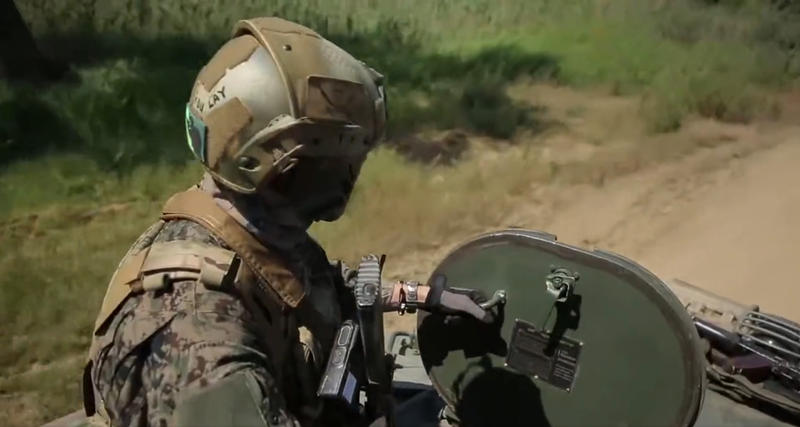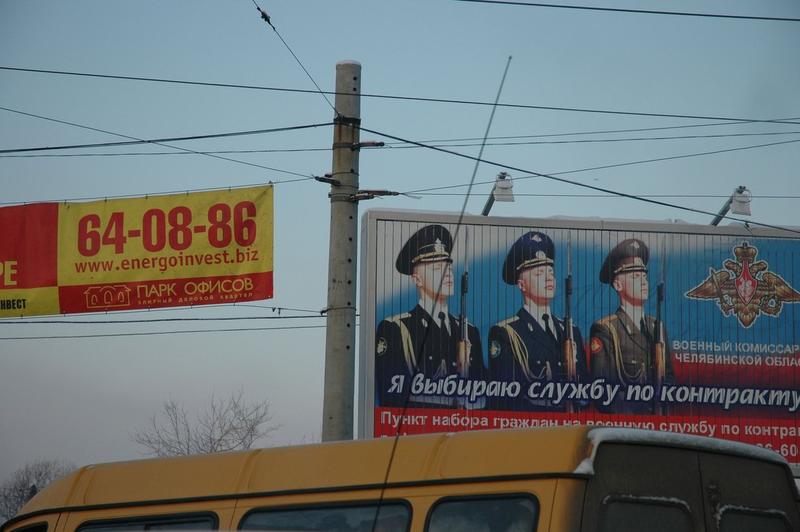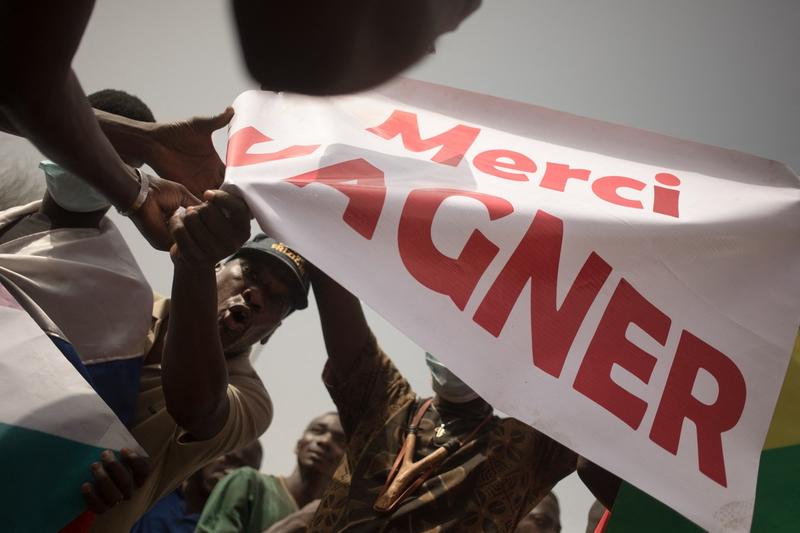
on paper The Wagner Group, a Russian mercenary network– the so-called personal army of Putin – does not exist. She does not file tax returns, her alleged supporters deny any connection to her, and officially private military companies (PMCs) are illegal in Russia.
“Mercenaries do not have an official status, so they do not have the same rights or guarantees as an official representative of the armed forces, and they are paid only after the mission is completed,” Marat Gabidullin told Al Jazeera.
“You complete a mission, you get paid, and you can go on vacation,” she says.
Gabidullin, whose identity has been confirmed by Russian and Ukrainian media, is the only former mercenary of Wagner’s group who has made his experience public.
He now lives in the south of France, where he says he is seeking refuge, and has written a memoir, Twice in the Same River, about his experiences.
Founded by intelligence officer Dmytro Utkin in 2014 to support Ukrainian separatists, Wagner has since represented the interests of Russia and its allies in Africa and the Middle East, taking part in the Syrian civil war on the side of President Bashar al-Assad – and the militants have been accused of several crimes
It used to be a shadowy force, but now it is taking on an increasingly public image as the war in Ukraine continues.

Wagner’s mercenaries were sent to fight in Ukraine. Photo: Video
“He was always part of either military intelligence or special operations forces,” Russian military expert Pavlo Luzin told Al Jazeera. “It was never private or somehow autonomous.”
Wagner has two goals
According to Luzin, the first is to take advantage of hot people who might otherwise pose a security threat at home.
The second is the redistribution of forces from the official armed forces.
“We are dealing with the fragmentation of military power, which is characteristic of authoritarian regimes,” explained Luzin.
“Wagner” is not elite troops or well-trained special forces, but just another “cannon fodder” aimed at countering any political threat from the generals. The Kremlin simply does not trust the armed forces,” the expert says.
The mercenary group is believed to be funded and controlled by Yevgeny Prigozhin, a Russian oligarch known as “Putin’s chef” for his numerous catering contracts, through a network of shell companies.
For example, a company called Europolis LLC allegedly agreed with Damascus to conduct military operations in Syria in exchange for 25 percent of the oil and gas it finds. It is known that its founder is close to Prigozhin and was seen in Utkin’s company.
In 2017, Uktin and Wagner were sanctioned by the administration of former US President Donald Trump for sending militants to Ukraine.
Prigozhin denies any ties to Wagner, going so far as to file complaints with the authorities after being questioned on the subject by journalists.

The Wagner group is supplied with equipment from the Russian army Photo: Diana Ninov / Alamy / Profimedia Images
Why Wagner is looking for attention now
But as Wagner’s involvement in Ukraine grew, he proudly stepped into the spotlight.
A Telegram user recently posted an image purporting to show billboards in Russia promoting and recruiting for “Wagner,” with job postings reportedly offering a salary of 240,000 Russian rubles (just under $4,000) per month, much higher than than the salary of an ordinary soldier.
“Essentially, Wagner has now become so public precisely because of his change in status,” Mark Galeotti, a Russian security expert, told Al Jazeera.
“Whereas it was once a remote tool of the Russian state that it could turn down when necessary, as well as a fairly autonomous commercial enterprise, it is now really little more than an extension of the military. This is an alternative source of combat power, necessary precisely because it is only a “special military operation” and therefore the Kremlin cannot simply mobilize the people it needs,” says Galeotti.
Motivated by money
“Idealistic reasons [pentru a deveni mercenar] they are only a cover; basically everyone’s motivation is money,” Gabidullin, who served at Wagner from 2015 to 2019, told Al Jazeera by phone.
“Then I was in a state of depression, I didn’t know what to do with myself, what to do and where to go. I was unemployed for some time. Then I heard about the possibility of returning to my previous profession – I was a military personnel and served in the Air Force for 10 years,” he says.
“When I joined the platoons, most of the people there had combat experience in several wars – Chechnya, Georgia – and most had combat experience in Ukraine since 2014.”
Gabidullin participated in the campaign in Syria, where during the battle for Palmyra he was wounded by a grenade explosion.
“Supreme Command [rusesc] sold it as a bloodless war abroad, but quickly came to terms with the fact that this concept does not work in Syria,” he recalled. the army was simply no match for ISIS (ISIS),” says the Russian mercenary.

The Wagner Group would operate in Ukraine, Syria and African countries Photo: FLORENT VERGNES / AFP / Profimedia
Gabidullin described the Syrian army as unprofessional and unmotivated, with rampant corruption flourishing at all levels.
“But the Russian high command needed to maintain visibility, so they brought in mercenaries, because mercenary losses were not included in the official figures,” he said. “In this way, the illusion of a bloodless war was achieved, but in reality a lot of blood was shed.
“We fought in this war. No one else could do what we did,” he says.
In 2018, dozens of Russian mercenaries are believed to have died in US airstrikes against pro-government forces in Syria after they attacked an oil facility that was being defended by the Americans.
But little is known about the mercenaries who die, in part because their families are forced to keep quiet.
In addition to Syria, “Wagner” has been actively working in Africa since 2017
In Sudan, he reportedly controls gold mining operations, working closely with Sudan’s military government. Activists and bloggers accuse Russia of supporting a military coup in Sudan and stealing the country’s gold.
In the Central African Republic (CAR), “Wagner” repelled a rebel attack on Bangui last January. (Full on Al Jazeera)

Mercenary Wagner wounded in Ukraine (capture of UNIAN)
- Read also: The interesting case of Russia in the Central African Republic / Wagner’s influence and how the Russian language became the third official language
10,000 mercenaries would fight on the side of pro-Russian separatists in Ukraine
Wagner’s group does not officially exist, the BBC investigation said, but up to 10,000 people are believed to have had at least one contract with Wagner since the group began fighting alongside pro-Russian separatists in eastern Ukraine in 2014.
An estimated 1,000 of Wagner’s fighters fought alongside General Khalifa Haftar in 2019 and 2020. The BBC in Russia asked ex-fighter Wagner to describe the group. “This is a structure designed to advance the interests of the state outside our country,” he said.
As for the combatants, he noted that they are “war professionals”, people looking for work or romantics who want to serve their country.
Last December, EU foreign ministers unanimously approved sanctions against the Russian mercenary group Wagner.
Three companies associated with the Wagner group were also targeted: Evro Polis, Mercury and Velada.
Read also:
- Wagner’s group began recruiting prisoners – British report
Why Russia uses Wagner group pilots. How much are hired workers paid per month - Wagner mercenaries armed by the Russian army committed war crimes in Libya: “Nobody wants an extra mouth to feed” (BBC investigation)
Source: Hot News RU
James Springer is a renowned author and opinion writer, known for his bold and thought-provoking articles on a wide range of topics. He currently works as a writer at 247 news reel, where he uses his unique voice and sharp wit to offer fresh perspectives on current events. His articles are widely read and shared and has earned him a reputation as a talented and insightful writer.